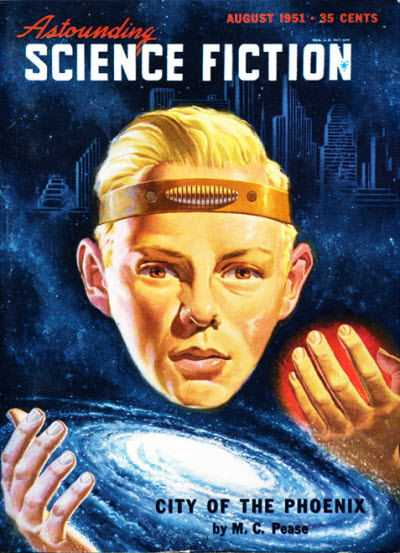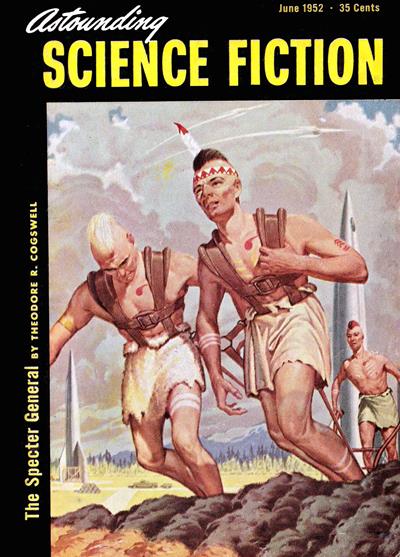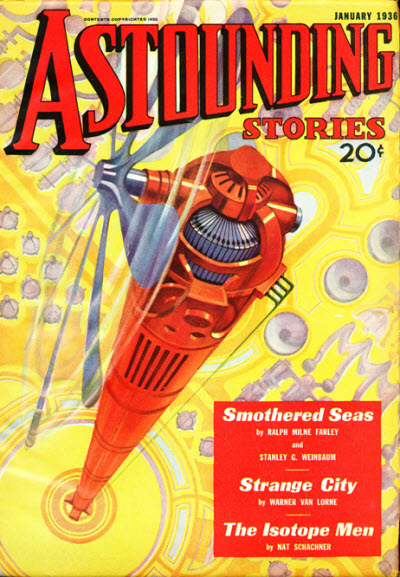
Part of Series
Vol 47, No 6. Contents: 6 • Reality • [Editorial (Astounding)] • essay by John W. Campbell, Jr. [as by The Editor] 8 • City of the Phoenix • novelette by M. C. Pease 44 • Courtesy • short story by Clifford D. Simak 61 • In Times to Come (Astounding, August 1951) • [In Times to Come (Astounding)] • essay by The Editor 62 • The Soul-Empty Ones • novelette by Walter M. Miller, Jr. 95 • The Bodyguard • novelette by Vernon Glasser [as by Vernon W. Glasser] 114 • Prometheus • [Tree Houses] • short story by Julian Chain 130 • The Monkey Wrench • short story by Gordon R. Dickson 140 • The Analytical Laboratory: May 1951 (Astounding, August 1951) • [The Analytical Laboratory] • essay by The Editor 141 • Book Reviews (Astounding, August 1951) • essay by various 144 • The Price • short story by Dave Dryfoos 156 • Brass Tacks (Astounding, August 1951) • [Brass Tacks] • essay by The Editor 156 • Letter (Astounding, August 1951) • essay by John Aiken [as by John K. Aiken] 160 • Today It's Turbulence • essay by R. S. Richardson.
Authors


"He was honored by fans with three Hugo awards and by colleagues with one Nebula award and was named the third Grand Master by the Science Fiction and Fantasy Writers of America (SFWA) in 1977." (Wikipedia) See http://en.wikipedia.org/wiki/Clifford...

From the Wikipedia article, "Walter M. Miller, Jr.": Miller was born in New Smyrna Beach, Florida. Educated at the University of Tennessee and the University of Texas, he worked as an engineer. During World War II, he served in the Army Air Corps as a radioman and tail gunner, flying more than fifty bombing missions over Italy. He took part in the bombing of the Benedictine Abbey at Monte Cassino, which proved a traumatic experience for him. Joe Haldeman reported that Miller "had Post Traumatic Stress Disorder for 30 years before it had a name". After the war, Miller converted to Catholicism. He married Anna Louise Becker in 1945, and they had four children. For several months in 1953 he lived with science-fiction writer Judith Merril, ex-wife of Frederik Pohl and a noted science-fiction author in her own right. Between 1951 and 1957, Miller published over three dozen science fiction short stories, winning a Hugo Award in 1955 for the story "The Darfsteller". He also wrote scripts for the television show Captain Video in 1953. Late in the 1950s, Miller assembled a novel from three closely related novellas he had published in The Magazine of Fantasy and Science Fiction in 1955, 1956, and 1957. The novel, entitled A Canticle for Leibowitz, was published in 1959. A Canticle for Leibowitz is a post-apocalyptic (post-holocaust) novel revolving around the canonisation of Saint Leibowitz and is considered a masterpiece of the genre. It won the 1961 Hugo Award for Best Novel. The novel is also a powerful meditation on the cycles of world history and Roman Catholicism as a force of stability during history's dark times. After the success of A Canticle for Leibowitz, Miller never published another new novel or story in his lifetime, although several compilations of Miller's earlier stories were issued in the 1960s and 1970s. In Miller's later years, he became a recluse, avoiding contact with nearly everyone, including family members; he never allowed his literary agent, Don Congdon, to meet him. According to science fiction writer Terry Bisson, Miller struggled with depression during his later years, but had managed to nearly complete a 600-page manuscript for the sequel to Canticle before taking his own life with a gun in January 1996, shortly after his wife's death. The sequel, titled Saint Leibowitz and the Wild Horse Woman, was completed by Bisson and published in 1997.


